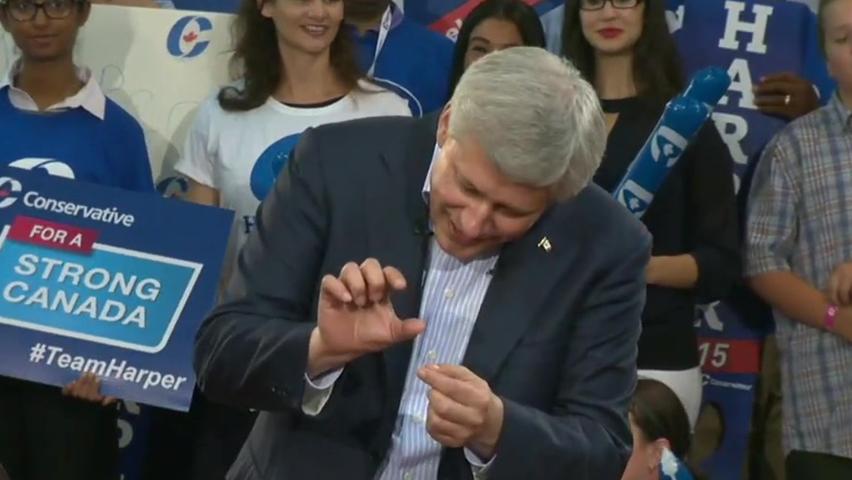Harper's record on respect is not good. He has always treated Parliament with contempt. In fact, he was found in contempt of parliament back in 2011, for which he was sadly rewarded with a majority. But what he is doing now shows his disrespect not only for his opponents, but our democracy. One example from earlier this year shows the PM mocking Tom Mulcair's legitimate question about Canadian action in Syria and giving a non answer. And this sort of response has been fairly normal since the Conservatives took power. Harper clearly has no respect for Question Period or for the Parliamentary process. He simply does not feel obliged to answer questions.
Harper's disrespect of opponents, particularly Trudeau, also seems to follow a trend. Trudeau makes use of a rather common analogy or statement, or puts out a sensible plan for the future, the Conservatives take a sound bite or some scrap and turn it into a media line that they then use to mock him on panel shows and at their rallies. It doesn't even matter to them if their own reason for mocking Trudeau is inherently flawed or just plain silly, or that their own record show that they are hypocrites on the issue.
Take for example the whole "from the heart outward" thing. Trudeau uses a rather common analogy in the English language, which is to describe the centre or most important aspect of an entity as the heart, and then suddenly the Conservatives pretend that this analogy doesn't make sense? Most speakers of the English language know that it does, yet the Conservatives put Michelle Rempel on TV talking about how silly a perfectly understandable analogy is? And the press ran with it, even though mocking him for this statement makes no sense whatsoever.
Also to add to this is Harper's mocking of Trudeau's rather sensible plan to make a massively needed investment in infrastructure, while giving an expected date for when the economy would be out of deficit. I am not an economic expert, but it seems that most economists agree that Canada's infrastructure needs investment, in fact, it needs much more than what Trudeau is even proposing. Going into deficit to pay for infrastructure will pay for itself in time, and it will also get Canada out of the stagnant and persistent lack of growth which is keeping us from balancing the books. Of course no leader is above criticisms, but I think Mr. Mulcair's response was both more respectful and clearer than Harper's, who seems to ignore his own record of 8 years of deficits when mocking Trudeau's plan to run a deficit for a few years to invest in things we need.
And then there is the matter of not addressing a political opponent respectfully, and choosing instead to use their first name, or no name on the campaign trail. Both Harper and Mulcair have been guilty of this, but Muclair has not been so brazen about it as Harper. I think it is a mistake to treat any opponent, no matter how competitive or competent they are, with disrespect. If you are going to criticize someone, do it for something that they deserve to be criticized for. This sort of petty personality attack turns voters off, but I suppose that is what Harper is hoping to do because he wants to shrink the voter pool as much as possible to boost his chances.
And then there is the matter of not addressing a political opponent respectfully, and choosing instead to use their first name, or no name on the campaign trail. Both Harper and Mulcair have been guilty of this, but Muclair has not been so brazen about it as Harper. I think it is a mistake to treat any opponent, no matter how competitive or competent they are, with disrespect. If you are going to criticize someone, do it for something that they deserve to be criticized for. This sort of petty personality attack turns voters off, but I suppose that is what Harper is hoping to do because he wants to shrink the voter pool as much as possible to boost his chances.
But all of this sort of petty nonsense is really the worst part of modern politics. The sad part is that even though people decry this sort of thing and say that they want to hear about the issues and they want to hear the truth, when a politician speaks the truth about a matter when it isn't good news, people don't vote for them. Do people really want to hear the truth? Or do they just want their politicians to confirm their own political biases?

No comments:
Post a Comment